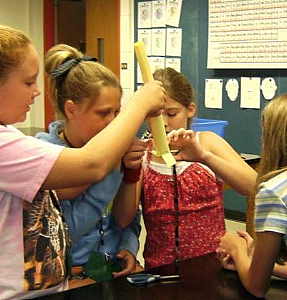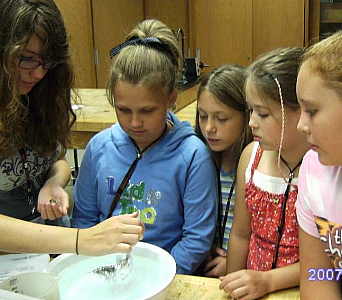Chemistry
In chemistry the campers learned how chromatography can be used to determine the kind of ink that was found at a crime scene.
They used a microscope to examine materials and recorded their observations in a notebook so that they could later use the information to help solve a crime.
They recorded and categorized fingerprints.
Learned how to identify five different white powders.
The chemistry instructor this year is one of the camp alumni from many years ago.
Astronomy
In their astronomy class students built a calculator that could be used to determine the time.
If they knew what day it was and they and they had a view of the north circumpolar constellations.
They also made a spectroscope that could be used to study the composition of a light source.
They built rocket launchers.
Then constructed rockets to be launched.
The astronomy instructor is an alumnus of the camp as well.
Physics
The students learned some of the effects extreme cold has on the physical, electrical, and chemical properties of various materials.
This web page has some information about what they studied.
We also took advantage of liquid nitrogen's properties to make ice cream ready to serve in about 15 seconds.
Another day they measured the coefficient of friction of some materials found in a fast food restaurant.
Then recorded their measurements on a data sheet and did some calculations to arrive at the result.
And determined the viscosity of salad dressing, hand soap, ketchup and other liquids that you might find there.
They measured the current drawn by a motor that was turning a cylinder in a cup of each substance.
The more viscous it was, the harder it was for the motor to turn it, and the more current was required.
They made "musical" instruments out of straws.
Built Cartesian divers from straws and modeling clay.
They really didn't believe that two eggs would support 4 or more of their classmates.
Add one more and this is the result.
The actual weight, in pounds, supported in each of the classes:
Orange 231.8, Yellow 241.7, Green 249.3, Red 261.8, and Blue 269.0
Computers
Campers studied computer logic and then applied it to puzzles.
They started out in a circle with their arms crossed then tried to all get turned around without leaving go.
They then tried to explain what they did in simple steps.
This was an illustration of how programers must enter precise and detailed instructions on the computer if they are to accomplish their task.
They learned to use a program that allowed them to create a composite drawing of a suspect.
One of the goals was to make a picture of the Astronomy instructor.
Here are some of the results.
They enjoyed trying to beat one of the early computer games, Asteroids.
Biology
Owl pellets were carefully dissected to determine just what the owl had eaten.
Most of the kids were fascinated even if they were a little put off by just what they were seeing.
Can you determine blood types? Well they know how after this class.
Remember the crime mentioned earlier, well they considered how various weapons could be used
And what could be learned from the blood splatters that would be produced.
.
Thursday we had contests all day
I will add a picture of the crime scene when it is available
Periodic table scrabble
The goal is to write down as many words as you can think of using only the letter combinations from the periodic table.
Paper skyscraper
Build the highest possible self supporting tower using only 1 sheet of paper and tape.

Aluminum foil boat
Given a square of aluminum foil, build a boat that can carry the greatest number of marbles.

Water balloon slingshot
You get points for accuracy.
Write it Build it
One of your team members writes a description of a Lego block structure.
Then the others have to assemble a matching structure with only that description for guidance.
Egg drop
The eggs (entirely unprotected) were raised up to 6.5 meters (21.3 ft.) above the floor.
Then dropped into a catch box that the kids had built on their own.
The greater the drop and shorter the catch box the higher the score.
The variety of designs was remarkable.